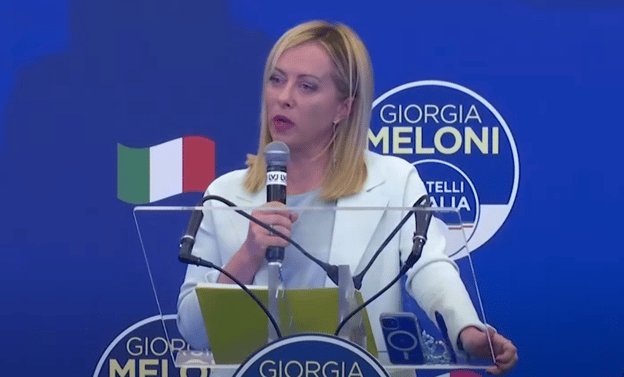Giorgia Meloni and a coalition of center-right parties have won the snap elections in Italy after Mario Draghi’s consensus government fell apart amid crippling 9 percent inflation fueled by high energy costs as Europe falls into recession.
Meloni’s Brothers of Italy won 26 percent of the vote, and Mateo Salvini and Silvio Berulsconi’s parties won 8.8 percent and 8 percent each, respectively. With 44 percent, they mark the largest party coalition, and should win about 235 seats of the 400-seat lower house and 115 seats of the 200-seat senate, according to a YouTrend projection.
Meanwhile, the center-left Democrats only won 19 percent of the vote along with 7 percent for the remainder of the left-wing coalition, winning just 26 percent of the vote. The breakaway Five Star Movement, which triggered the snap elections when it withdrew from the Draghi government, garnered about 15.5 percent of the vote, losing half its support from 2018, when it won the general election with 32 percent of the vote.
After initially forming a coalition with Salvini’s center-right League, that arrangement soon fell apart and the Five Stars instead governed with the center-left coalition instead. Then, Draghi was appointed in early 2021 after the collapse of Giuseppe Conte’s Five Star-led government, with both the center-left and the center-right supporting Draghi, but Five Star was still the crucial kingmaker with the largest plurality of seats in parliament. Without the Five Stars, Draghi did not command the support of anything close to approaching a legislative majority.
Now, the results seem to follow a pattern in 2022 as Italy’s voters said it was “time for a change.” After years of narrowly fought elections and no party able to form a solid majority in the nation’s parliament, here, Meloni seems to have won a decisive result with 44 percent of the vote. In 2018, the center-right garnered just 31 percent of the vote.
The 14-point improvement by the center-right implies heavily that Meloni was able to win over about half of the voters from the Five Stars with her Italy first platform that opposes European Union regulations, particularly those that increase immigration. Also, unemployment remains at 7.9 percent, which is actually a 3-year low from being north of 10 percent during Covid, amid a slower recovery in southern Europe from the economic lockdowns that crippled the global economy in 2020.
Now, high energy costs are the problem, and with another recession immediately on the horizon along with another drop in demand for labor still to come, Meloni’s attention will surely turn towards economic matters once her coalition government is formed.
Across the pond, in the U.S. voters will also be voting in legislative elections via the Congressional midterms, with Republicans favored to pick up seats at least in the House of Representatives. After President Joe Biden’s narrow win in the 2020 presidential election, usually it is the opposition party with the wind in its sails.
In 1994, 1998, 2006, 2010, 2014 and 2018, the result was mixed government, with one party in control of the White House and the other with control of the House and/or the Senate. Both Barack Obama and Donald Trump maintained Senate majorities in their first midterms. Obama lost the Senate in his second midterm. Bill Clinton and George W. Bush lost both the House and the Senate in 1994 and 2006, respectively.
Such a U.S. outcome might stand in contrast to the result in Italy, but electorally the results are actually similar, with similar forces at play. The difference is the unique feature of the American system as a non-parliamentary model, where the legislature was designed to check the power of the executive, who is elected separately. Whereas in Italy and other parliamentary systems, the legislature is led by the prime minister, the leader of whichever party has the ruling majority from the legislative elections.
Meaning, in Italy, for once, the outcome will be clear majorities in the parliament and a mandate to govern. There, the legislature can be more powerful—provided it can achieve the critical legislative majorities, something that eluded the Five Stars in 2018, and compelled it to fenagle governing coalitions, first among the center-right parties, and then the center-left. In this case, Meloni can govern simply with the Salvini and Berlusconi center-right parties in tow.
Which, is definitely a change from the administrations that preceded it. Time will tell if similar winds are blowing across the Atlantic as the American people go to the polls in November. Stay tuned.
Robert Romano is the Vice President of Public Policy at Americans for Limited Government Foundation.







